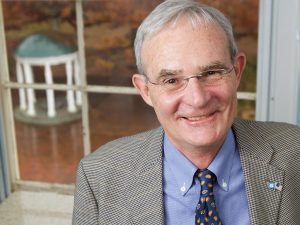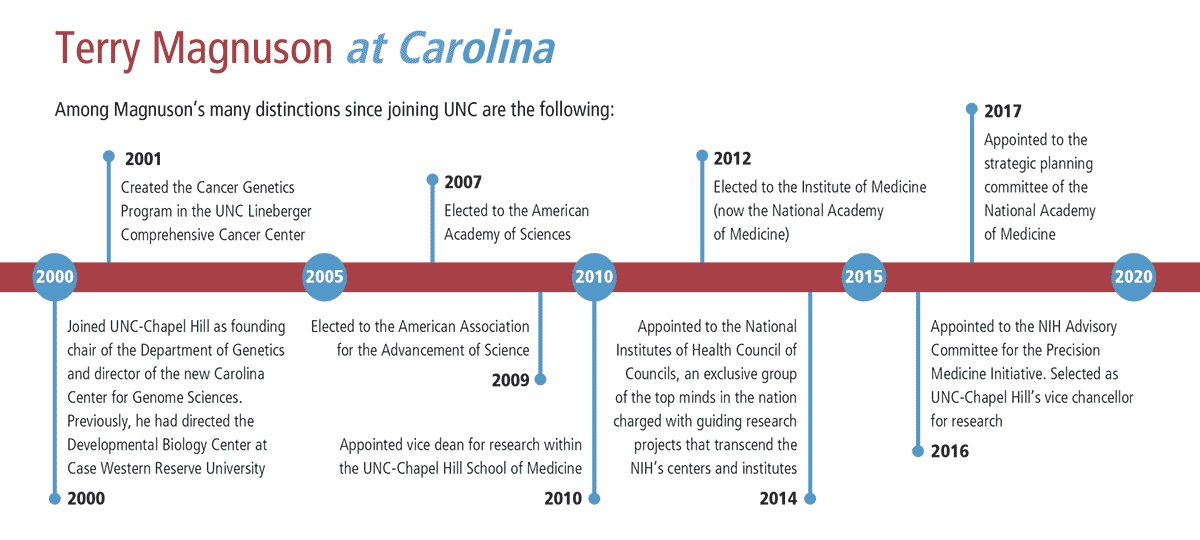New UNC vice chancellor for research loves when graduate students challenge his ideas. According to Terry Magnuson, Ph.D., science is difficult— but graduate students make it fun. Magnuson, the new vice chancellor for research at the University of North Carolina at Chapel Hill, says the most enjoyable part of conducting science is working with graduate students and postdoctoral fellows.

According to Terry Magnuson, Ph.D., science is difficult— but graduate students make it fun. Magnuson, the new vice chancellor for research at the University of North Carolina at Chapel Hill, says the most enjoyable part of conducting science is working with graduate students and postdoctoral fellows.
He explains that graduate students have always been an invaluable component of his research team. He enjoys the student-mentor relationship, and welcomes fresh ideas and research contributions from students.
“They’re excited, they’re passionate, they like what they’re doing, and that’s what makes our work fun,” Magnuson says. “Doing science is not easy. Ninety percent of what you do doesn’t work. You have to come back and approach it again. So having graduate students and postdocs around me, that’s what makes doing the work pleasurable.”
When Magnuson was recruited to UNC-Chapel Hill in 2000, the distinguished mammalian geneticist brought his 15-member laboratory team—including four graduate students—and 10,000 mice along with him.
Initially, Magnuson served as the founding chair of the Department of Genetics and first director of the Carolina Center for Genome Sciences. Among many other accomplishments, he has since created the Cancer Genetics Program and was elected to the American Academy of Sciences, the American Association for the Advancement of Science and the National Academy of Medicine.
Magnuson is enthusiastic about connecting various science disciplines and integrating research across the entire university, which he refers to as research convergence. He says graduate students are the key to these connections and to solving the challenging research questions of the world.
“Doing science is not easy. Ninety percent of what you do doesn’t work. You have to come back and approach it again. So having graduate students and postdocs around me, that’s what makes doing the work pleasurable.”
“Graduate students are the ones who go out to find out who is doing what, and how their work can move a project along,” he says. “They are the ones who bring labs in disparate fields together, which is how you answer very challenging questions.”
Magnuson points out that pharmaceutical and biotechnology industries look to universities to see what research has potential, and depend on the talent that comes from universities such as UNC-Chapel Hill.
Noting that many science careers outside of academia require graduate education, Magnuson also emphasizes the importance of professional training, internships in industry and programs such as the Professional Science Master’s degrees.
“I think The Graduate School does an outstanding job highlighting and holding workshops for graduate students on the various career paths open and available to them,” he says.
Magnuson and the Office of the Vice Chancellor for Research are committed to providing the necessary research environment and technology for research, and most importantly, to making cross-departmental connections. He says that his office works closely with The Graduate School to ensure a wide range of training and credentialing opportunities for students.
“Our office is focusing on grand challenges and ideas, and then collecting the appropriate groups of people to get started,” he says. “I believe that puts graduate students in a great position for exciting research opportunities.”
A total of 16 graduate students and 36 postdoctoral fellows have passed through Magnuson’s lab since his arrival at Carolina. The dynamic between Magnuson and students is a shared learning experience, and he says he learns from his students all the time.
“The thing I love the most is when they challenge my ideas,” he says, recalling a time when he told a graduate student to go back to the lab and try again. “I made him go back four or five times until he finally convinced me with all of the data. It led to a completely new discovery that changed the direction of the lab and opened a new field of science. And that’s what you like to see.”

Among Magnuson’s many distinctions since joining UNC are the following:
2000– Joined UNC-Chapel Hill as founding chair of the Department of Genetics and director of the new Carolina Center for Genome Sciences. Previously, he had directed the Developmental Biology Center at Case Western Reserve University
2001– Created the Cancer Genetics Program in the UNC Lineberger Comprehensive Cancer Center
2007– Elected to the American Academy of Sciences
2009– Elected to the American Association for the Advancement of Science
2010– Appointed vice dean for research within the UNC-Chapel Hill School of Medicine
2012– Elected to the Institute of Medicine (now the National Academy of Medicine)
2014– Appointed to the National Institutes of Health Council of Councils, an exclusive group of the top minds in the nation charged with guiding research projects that transcend the NIH’s centers and institutes
2016– Appointed to the NIH Advisory Committee for the Precision Medicine Initiative. Selected as UNC-Chapel Hill’s vice chancellor for research
2017– Appointed to the strategic planning committee of the National Academy of Medicine
~article by Lauren Haller, April 7, 2017, in the Carolina Chronicle
